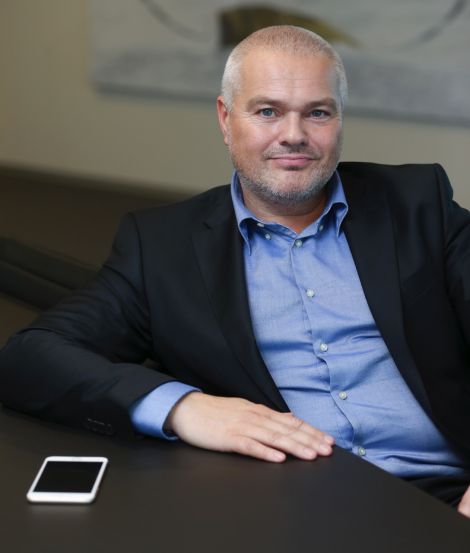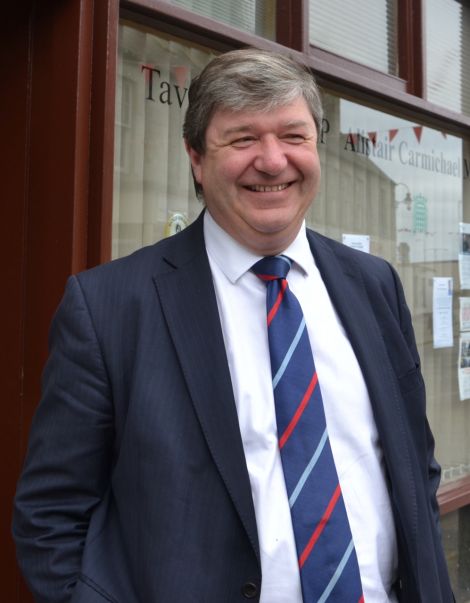News / Could Faroe solve mobile phone ‘notspots’?
FAROESE Telecom is lobbying Westminster to give it access to the UK market so it can provide the same “world-class” mobile phone network to Shetland and Orkney that Faroe enjoys today.
The state-owned firm’s chief executive Jan Ziskasen, who has visited both island groups in recent months, says the company is “very interested” in bringing its much-praised network to Scotland’s islands and possibly remote parts of the Highlands.
Its SHEFA subsea cable already comes ashore in both Shetland and Orkney, which would provide the necessary “backhaul’, and Ziskasen claims the company has the world’s finest network in terms of coverage, quality, speed and capacity.
The UK government and regulator Ofcom sold off mobile spectrum to commercial companies already operating in this country. Ziskasen is calling for them to open up the licence in areas where the likes of O2 and Vodafone are failing to provide a comprehensive network.
“That is currently what is holding us back,” Ziskasen told Shetland News. “What we are proposing to Ofcom and to the councils and government is, if there was to be an exemption of some sort that would cover small areas and small islands, then we would be more than happy to go in because that’s our speciality.
“Today in Faroe we have 100 per cent coverage – undersea tunnels, remote places, you have coverage.”
EE is introducing 4G signal for its customers in Shetland. At last month’s Northern Isles digital forum meeting, O2 said it would work with Vodafone to upgrade existing mobile networks to 4G too – but admitted that would do nothing to help areas currently without any signal.
Faroese Telecom is fully state-owned and serves a population of just under 50,000 – similar to the combined population of Shetland and Orkney.
“For [companies like O2 and Vodafone] it’s much more interesting to stay in London, Birmingham and Manchester,” Ziskasen said.
Become a member of Shetland News
“We have a similar problem – for us, in customer base, the capital and a couple of other areas [are the most economic].
“But we have chosen to go out everywhere – we cover islands that have two people. From a business point of view not very clever, but from a country point of view it’s the right thing to do.”
On his trips to Orkney and Shetland, he “felt really sorry for the islands” and spoke to young people who had moved back from the Scottish mainland and felt “disconnected” because they couldn’t access social media. There are businesspeople, meanwhile, who are “missing out on all kinds of stuff”.
Ziskasen said Faroe was geographically so close to the Northern Isles, yet “there’s such a big difference” in other ways and he would love for his company to play a part in changing that: “We would be very excited if this became a reality.”
Marvin Smith of Shetland Telecom said Faroe had “without a doubt the best mobile network around in terms of coverage and performance” that he has ever experienced.
He said the government “pocketed vast sums” by selling UK-wide licences to companies such as O2, Vodafone and EE.
“These mobile operators are understandably very protective of their investment but in areas like Shetland there is no commercial incentive to improve services,” Smith said.
“So we are falling further and further behind with no real chance of much improvement. If Vodafone or O2 want to deploy a new cell it makes far more sense to them, as a business, to deploy it in Birmingham or Glasgow where they can hit an area of high population density.
“If Shetland is ever going to partake in the modern world then the government is going to have to introduce localised licensing of the mobile spectrum. It’s not a technical problem, it’s just financial.
“I would really like to see licensing of mobile spectrum devolved to a local level. Then we could work on the best solution for Shetland.”
Northern Isles MP Alistair Carmichael said he had been in touch with Faroese Telecom for “quite some time” and “if they can do what they think they can do, it will be great and I’m quite happy to encourage them”.
He said nationwide licensing always left areas like Shetland “in danger of being missed out”.
“If EE do what they say they’re going to do, we’re going to have pretty comprehensive coverage and they will have paid quite handsomely for that,” Carmichael said, so they might understandably be protective of their licence.
“Vodafone and O2, on the other hand, do still seem to have a bit of catching up to do.
“[The Faroese] are coming into a market which is already fairly heavily regulated. It’s not a cheap market to break into, and I suspect that they will find that for themselves, but I’m more than happy to give them any help or encouragement.
“Somebody that was prepared to go in and challenge the big companies, and to inject some genuine competition into the market, could only be good for us.”
Become a member of Shetland News
Shetland News is asking its readers to consider paying for membership to get additional perks:
- Removal of third-party ads;
- Bookmark posts to read later;
- Exclusive curated weekly newsletter;
- Hide membership messages;
- Comments open for discussion.
If you appreciate what we do and feel strongly about impartial local journalism, then please become a member of Shetland News by either making a single payment, or setting up a monthly, quarterly or yearly subscription.




























































